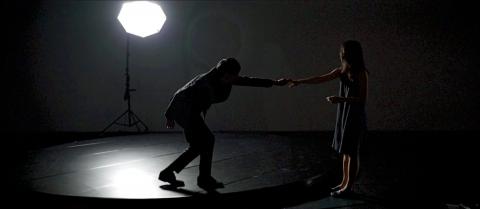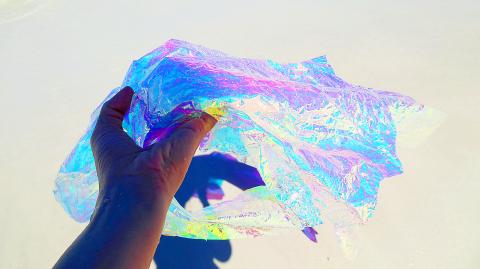Two research-oriented, technology-heavy programs are on offer for modern dance fans in Taipei this weekend: Huang Yi Studio’s (黃翊工作室) “Interdisciplinary Project Preview” (科技創作計畫 藝文贊助專場) and Su Wen-chi’s (蘇文琪) Unconditional Love and Fact (全然的愛與真實).
Choreographer/dancer Huang Yi (黃翊) and his troupe have been touring abroad over the past two years with Huang Yi & KUKA (黃翊與庫卡) and he said he is often asked when they will perform again in Taiwan. The answer is next year, when his new work, Under the Horizon, is scheduled to be presented as part of the opening season of the Taipei Performing Arts Center in Taipei’s Shilin District (士林).
To wet fans’ appetite, and more importantly, to raise money to complete the show, he and his team will be at the Cloud Gate Theater in New Taipei City’s Tamsui District (淡水) tomorrow with a preview of the piece, a collaboration with the Utrecht-based Nederlands Kamerkoor (Netherlands Chamber Choir) and Berlin-based Japanese multi-media artist Ryoichi Kurokawa.

Photo: courtesy of Huang Yi Studio
Huang Yi said Under the Horizon was inspired by the man who worked as his technical director when the company performed in Switzerland. Although the man is not wealthy, he adopted a 14-year old pregnant Syrian refugee — doing what he could to help change the world.
Huang Yi said he was also touched by the subtle kindness of his tour director in Switzerland: when it came to mealtimes, the technical director would always order the cheapest thing on the menu to save money, while the tour director would always order too much food before saying she was full and giving most of her meal to the technical director.
This made him ask himself what he could do to help, Huang Yi said, and his answer was to create a show about the suffering of victims of war and about caring for others.

Photo: courtesy of Lin I-fang
Meanwhile, Su is back at the National Theater Concert Hall, where she has been artist-in-residence, for four performances in the Experimental Theater.
YiLab (一當代舞團) founder Su said she was inspired to create Unconditional Love and Fact by her artistic residency last year at the European Organization for Nuclear Research, which triggered questions about scientists, research, skepticism, beliefs and acceptance.
She says she was impressed with the scientists’ unlimited imagination as well as their skepticism. It made her wonder what makes humans believe in something, or anything, including love, and the difficulty of determining facts and the truth.
Su created Unconditional Love and Fact with Lin I-fang (林怡芳), a Taiwanese dancer who is based in Montpellier, France.
There is a program advisory that latecomers will not be admitted and there will be partial nudity, smoke effects and loud voices.
■ “Interdisciplinary Project Preview,” tomorrow at 3pm and 7:30pm at the Cloud Gate Theater (淡水雲門劇場), 36, Ln 6, Zhongzheng Rd Sec 1, Tamsui District, New Taipei City (新北市淡水區中正路一段6巷36號). As the shows are a fundraiser, the tickets are NT$1,000, NT$3,000, NT$5,000 and NT$10,000.
■ Unconditional Love and Fact is at the Experimental Theater (國家戲劇院實驗劇場), 21-1 Zhongshan N Rd, Taipei City (台北市中山南路21-1號) tonight and tomorrow at 7:30pm and tomorrow and Sunday at 2:30pm. Tickets are NT$600. Sunday’s show is sold out.
■ Tickets for both shows are available online at www.artsticket.com.tw, convenience store ticketing kiosks and at NTCH box offices

Taiwan has next to no political engagement in Myanmar, either with the ruling military junta nor the dozens of armed groups who’ve in the last five years taken over around two-thirds of the nation’s territory in a sprawling, patchwork civil war. But early last month, the leader of one relatively minor Burmese revolutionary faction, General Nerdah Bomya, who is also an alleged war criminal, made a low key visit to Taipei, where he met with a member of President William Lai’s (賴清德) staff, a retired Taiwanese military official and several academics. “I feel like Taiwan is a good example of

March 2 to March 8 Gunfire rang out along the shore of the frontline island of Lieyu (烈嶼) on a foggy afternoon on March 7, 1987. By the time it was over, about 20 unarmed Vietnamese refugees — men, women, elderly and children — were dead. They were hastily buried, followed by decades of silence. Months later, opposition politicians and journalists tried to uncover what had happened, but conflicting accounts only deepened the confusion. One version suggested that government troops had mistakenly killed their own operatives attempting to return home from Vietnam. The military maintained that the

Before the last section of the round-the-island railway was electrified, one old blue train still chugged back and forth between Pingtung County’s Fangliao (枋寮) and Taitung (台東) stations once a day. It was so slow, was so hot (it had no air conditioning) and covered such a short distance, that the low fare still failed to attract many riders. This relic of the past was finally retired when the South Link Line was fully electrified on Dec. 23, 2020. A wave of nostalgia surrounded the termination of the Ordinary Train service, as these train carriages had been in use for decades

Lori Sepich smoked for years and sometimes skipped taking her blood pressure medicine. But she never thought she’d have a heart attack. The possibility “just wasn’t registering with me,” said the 64-year-old from Memphis, Tennessee, who suffered two of them 13 years apart. She’s far from alone. More than 60 million women in the US live with cardiovascular disease, which includes heart disease as well as stroke, heart failure and atrial fibrillation. And despite the myth that heart attacks mostly strike men, women are vulnerable too. Overall in the US, 1 in 5 women dies of cardiovascular disease each year, 37,000 of them